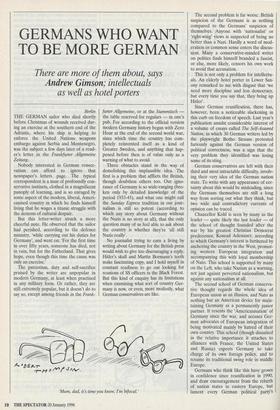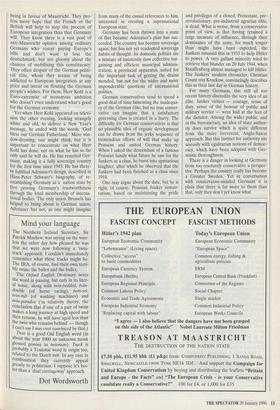GERMANS WHO WANT TO BE MORE GERMAN
There are more of them about, says Andrew Gimson; intellectuals as well as hotel porters Berlin THE GERMAN sailor who died shortly before Christmas of wounds received dur- ing an exercise at the southern end of the Adriatic, where his ship is helping to enforce the United Nations weapons embargo against Serbia and Montenegro, was the subject a few days later of a read- er's letter in the Frankfurter Allgemeine Zeitung.
Nobody interested in German conser- vatism can afford to ignore that newspaper's letters page. The typical correspondent is a man of profoundly con- servative instincts, clothed in a magnificent panoply of learning, and is so enraged by some aspect of the modern, liberal, Ameri- canised country in which he finds himself living that he wages a titanic struggle with the demons of cultural despair.
But this letter-writer struck a more cheerful note. He observed that the sailor had perished, according to the defence ministry, 'while carrying out his duties for Germany', and went on: 'For the first time in over fifty years, someone. has died, not in vain, but for the Fatherland. That gives hope, even though this time the cause was only an exercise.'
The patriotism, duty and self-sacrifice praised by the writer are unpopular in modern Germany, at least when practised in any military form. Or rather, they are still extremely popular, but it doesn't do to say so, except among friends in the Frank- furter Allgerneine, or at the Stammtisch the table reserved for regulars — in one's pub. For according to the official version modern Germany history began with Zero Hour at the end of the second world war, since which time the country has com- pletely reinvented itself as a kind of Greater Sweden, and anything that hap- pened before then is of value only as a warning of what to avoid.
Three obstacles stand in the way of demolishing this implausible idea. The first is a problem that afflicts the British, though doubtless others too. Our igno- rance of Germany is so wide-ranging (bro- ken only by detailed knowledge of the period 1933-45), and what one might call the Sunday Express tradition in our jour- nalism is still so potent (according to which any story about Germany without the Nazis is no story at all), that the only question many of us feel able to ask about the country is whether they're 'all still Nazis really'.
No journalist trying to earn a living by writing about Germany for the British press would wish to give too discouraging a reply. Hitler's skull and Martin Bormann's teeth make fascinating copy, and I hold myself in constant readiness to go out looking for reunions of SS officers in the Black Forest. But this kind of enquiry has its limitations when examining what sort of country Ger- many is now, or even, more modestly, what German conservatives are like.
Mum, dad, it's time you knew, I'm bifocal.' The second problem is far worse. British suspicion of the Germans is as nothing compared to the Germans' suspicion of themselves. Anyone with 'nationalist' or `right-wing' views is suspected of being no better than a Nazi. Hardly a word of mod- eration or common sense enters the discus- sion. Many a conservative-minded writer on politics finds himself branded a fascist, or else, more likely, censors his own work to avoid that accusation.
This is not only a problem for intellectu- als. An elderly hotel porter in Lower Sax- ony remarked to me with disgust that 'we need more discipline and less democracy, but every time you say that, they bring up Hitler'.
Since German reunification, there has, however, been a noticeable slackening in this curb on freedom of speech. Last year's publication amidst considerable interest of a volume of essays called The Self-Assured Nation, in which 30 German writers led by the playwright Botho Strauss protested furiously against the German version of political correctness, was a sign that the very problem they identified was losing some of its sting.
German conservatives are left with their third and most intractable difficulty, involv- ing their very idea of the German nation state. To write with any appearance of cer- tainty about this would be misleading, since the Germans themselves are still a long way from sorting out what they think, but two wide and contradictory currents of opinion can be traced.
Chancellor Kohl is seen by many as the leader — quite likely the last leader — of the school of thought founded after the war by his greatest Christian Democrat predecessor, Konrad Adenauer, according to which Germany's interest is furthered by anchoring the country in the West, promot- ing western European integration and accompanying this with loyal membership of Nato. This school is supported by many on the Left, who take Nazism as a warning, not just against perverted nationalism, but against any nationalism at all.
The second school of German conserva- tive thought regards the whole idea of European union as an illusion, and Nato as nothing but an American device for main- taining Germany as a permanently junior partner. It resents the 'Americanisation' of Germany since the war, and accuses Ger- man advocates of European integration of being motivated mainly by hatred of their own country. This school (though disunited in the relative importance it attaches to alliances with France, the United States and Russia) expects Germany to take charge of its own foreign policy, and to resume its traditional swing role in middle Europe.
Germans who think like this have grown in confidence since reunification in 1990, and draw encouragement from the rebirth of nation states in eastern Europe, but lament every German political party's being in favour of Maastricht. They pro- fess more hope that the French or the British will help to stop the process of European integration than that Germany will. They know there is a vast pool of anti-Maastricht opinion among ordinary Germans who resent paying Europe's bills and don't want to lose the deutschmark, but are gloomy, about the chances of mobilising this constituency. They often despair of the German politi- cal elite, whom they accuse of being addicted to European integration at any price and intent on flouting the German people's wishes. For them, Herr Kohl is a Euro-extremist of monstrous ambition who doesn't even understand what's good for the German economy.
Yet when Herr Kohl appeared on televi- sion the other evening, looking strangely white and old, to deliver a New Year's message, he ended with the words, 'God bless our German Fatherland.' Mere win- dow-dressing, one might think, but it is important to concentrate on what Herr Kohl has done, not on what he has so far only said he will do. He has reunited Ger- many, making it a fully sovereign country for the first time since 1945. He has there- by fulfilled Adenauer's design, described in Hans-Peter Schwarz's biography, of re- establishing Germany as a nation state by first proving Germany's trustworthiness through the loyal membership of interna- tional bodies. The only union Brussels has helped to bring about is German union. Adenauer has not, as one might imagine from many of the casual references to him, interested in creating a supranational European state.
Germany has been thrown into a state of flux because Adenauer's plan has suc- ceeded. The country has become sovereign again, but has not yet readopted sovereign habits of thought. Its domestic politics are a mixture of insistently slow collective bar- gaining and efficient municipal adminis- tration: a provincial apparatus, suited for the important task of getting the drains mended, but not for the wider and more imponderable questions of international politics.
German conservatives tend to spend a good deal of time lamenting the inadequa- cy of the German elite, but no true conser- vative can imagine that a satisfactory governing class is created in a hurry. The difficulty for German conservatives is that no plausible idea of organic development can be drawn from the jerky sequence of tremendous efforts of will that make up Prussian and united German history. When I asked the descendant of a famous Prussian family what future he saw for the Junkers as a class, he burst into uproarious laughter, after which he observed that the Junkers had been finished as a class since 1918.
One may argue about the date, but he is right, of course. Prussian Junker conser- vatism, based on maintaining the pride and privileges of a closed, Protestant, pre- revolutionary, pre-industrial agrarian elite, is dead. What is worse, from a conservative point of view, is that having retained a large measure of influence, through their dominance of the army, for much longer than might have been expected, the Junkers misused this in 1933 to help Hitler to power. A very gallant minority tried to retrieve that blunder on 20 July 1944, when Stauffenberg almost managed to kill Hitler. The Junkers' modern chronicler, Christian Count von Krockow, convincingly describes this as their last day in German history.
For many Germans, this still all too recent history discredits the very idea of an elite. Junker virtues — courage, sense of duty, sense of the honour of public and military service — were laid at the feet of the dictator. Among the wider public, and in the bureaucracy, an idea of state author- ity does survive which is quite different from the more irreverent, Anglo-Saxon approach. But this instinct for authority sits uneasily with egalitarian notions of democ- racy, which have been adopted with Ger- manic thoroughness.
There is a danger in looking at Germany from too resolutely conservative a perspec- tive. Perhaps the country really has become a Greater Sweden. Yet in conversation with conservative-minded Germans it is plain that there is far more to them than that, only they don't yet know what.



























































 Previous page
Previous page